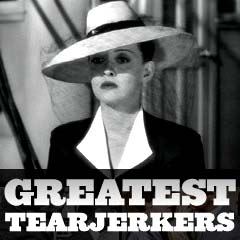|
The Greatest Tearjerkers of All-Time
|
|
Title Screen
|
Movie Title/Year and Brief Tearjerker Scene Description
|
Screenshots
|
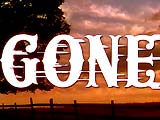
|
Gone
With the Wind (1939)
 #14 #14
- the final scene, in which
Rhett Butler (Clark Gable), tired of Scarlett O'Hara's (Vivien
Leigh) manipulations and indecisions, ignored her pleading to stay
with a dismissive line of dialogue before leaving: ("Frankly,
my dear, I don't give a damn")
- Scarlett's
teary-eyed resolution to keep trying while being reminded by voices
of Tara's power: ("I can't let him go. I can't. There must
be some way to bring him back. Oh I can't think about this now!
I'll go crazy if I do! I'll think about it tomorrow. But I must
think about it. I must think about it. What is there to do? What
is there that matters?... Tara!... Home. I'll go home, and I'll
think of some way to get him back! After all, tomorrow is another
day!")
|
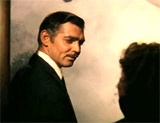
"Frankly, my dear, I don't give a damn"
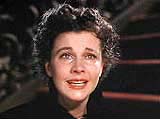
"Tomorrow is another day!"
|
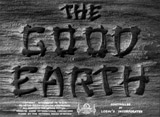
|
The Good Earth (1937)
- the self-sacrificing character
of O-Lan (Oscar-winning Luise Rainer)
- the terrifying revolutionary mob scene in which
the palace "Great
House" was ransacked/looted and pregnant O-Lan's stomach was
stepped on during the mad rush (causing a miscarriage)
- O-Lan's
poignant deathbed scene in the film's ending when Wang Lung (Paul
Muni) gave her two pearls ("You are the best a man can have")
- and as she died - the two pearls rolled from her outstretched hand
- the delivery of the film's final lines at the
final fade-out when Wang Lung quietly walked outside to an adjacent,
flowering peach tree planted by O-Lan on their wedding day. As
he grasped two limbs, he spoke in a reverential tone as the
film concluded: ("O-Lan,
you are the earth")
|
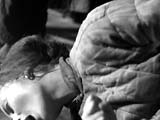
Mob Scene
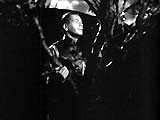
"O-Lan, you are the earth"
|
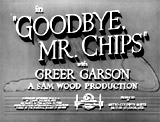
|
Goodbye,
Mr. Chips (1939)
 #24 #24
 #46 #46
- the nostalgic, deathbed scene
in which elderly schoolmaster Mr. Charles "Chips" Chipping
(Robert Donat) refuted the remark that he had been a lonely man
without children, with his exclamation: ("I
thought I heard you say 'twas a pity, a pity I never had children.
But you're wrong...I have...thousands of them...thousands of them...and
all boys!")
- "Chip's" death
as he closed his eyes while smiling, as the camera rose up when
he passed on - he dreamily remembered many schoolboys filing past
to repeat their names at call-over, while the music of the school
song swelled in volume in the background
- the final lad, the superimposed
image of the last Peter Colley, appeared and spoke directly into
the camera: ("Goodbye,
Mr. Chips...Goodbye...")
|
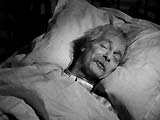
Mr. Chips' Death
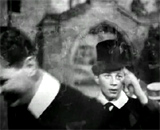
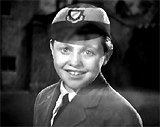
Schoolboys Filing Past
|

|
Good Will Hunting (1997)
- the "It's not your fault" scene in which
both South Boston
psychologist-therapist Sean Maguire (Robin Williams) and 20
year-old troubled, but intelligent genius and MIT janitor Will Hunting
(Matt Damon) discuss how they were victims of child abuse, and how
the trauma continues to affect Will - with Sean's assurances that
it wasn't his fault: (- "It's
not your fault." - "Yeah,
I know that." - "Look at me, son. It's not your fault." - "I
know." - "No. It's not your fault." - "I know." - "No,
no, you don't. It's not your fault. Hmm?" - "I know." - "It's
not your fault." - "Alright." - "It's not your
fault. It's not your fault." - "Don't f--k with me." - "It's
not your fault." - "Don't f--k with me, alright? Don't
f--k with me, Sean, not you!" - "It's not your fault. It's
not your fault." - "Oh, God, Oh God, I'm so sorry")
|
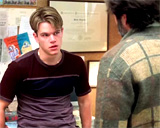
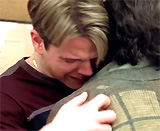
"It's Not Your Fault"
|
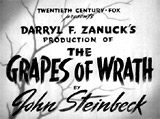
|
The
Grapes of Wrath (1940)
- the famous scene of Ma Joad (Jane Darwell) pausing
to moon over and then burn her letters/souvenir-keepsakes (a newspaper
clipping, a postcard, a china souvenir, and earrings) in the stove
before departing in a dilapidated truck on a long drive for California
to find employment (including the image of her holding earrings to
her ears and viewing herself in a mirror)
- Ma's son Tom Joad's
(Henry Fonda) stirring
"I'll be there" farewell speech to his mother: ("...I'll
be all around in the dark. I'll be ever'-where - wherever you can
look. Wherever there's a fight so hungry people can eat, I'll be
there. Wherever there's a cop beatin' up a guy, I'll be there. I'll
be in the way guys yell when they're mad - I'll be in the way kids
laugh when they're hungry an' they know supper's ready. An' when
the people are eatin' the stuff they raise, and livin' in the houses
they build - I'll be there, too")
- the final scene of Ma's
final inspiring words in the front seat of a pickup truck: ("We're
the people that live. They can't wipe us out. They can't lick us.
And we'll go on forever, Pa... 'cause... we're the people")
|
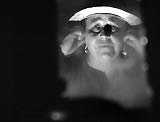
Ma Holding Earrings to Her Ears
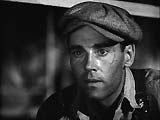
Tom Joad: "I'll Be There"
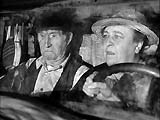
Ma's Inspiring Words
|

|
Grave of the Fireflies (1988, Jp.) (aka
Hotaru no Haka)
- director Isao Takahata's uncompromising, unflinching
anti-war melodrama about survival during WWII - from the famous
Ghibli Studio
- the opening image of 14
year-old Japanese war orphan Seita (voice of Tsutomu Tatsumi) telling
about his own death (from starvation), with his opening
narrated line:
"September 21, 1945. That was the night I died"; this was
followed by his own distressing glimpse of his body, found on
the floor of a Kobe
subway-railway station by a sweeper/janitor - followed
by flashbacks of his life in the final few months of WWII
- the scene of the death of Seita's mother (horrifically
burned by incendiary fire bombs during a war attack) after which
Seita lied to his 5 year-old sister Setsuko (voice of Ayano Shiraishi)
about it - and his attempt to distract her with gymnastics while
she was crying; soon after, the mother died from her burns
- the scene in which
Setsuko angrily begged her Aunt (voice of Akemi Yamaguchi) not to
trade her mother's kimonos in order to obtain white rice ("They're
Mama's - don't take them!") -- and their selfish aunt's appropriation
of most of the rice, and then the resentful Aunt accused Seita
and Setsuko of being selfish for wanting more, after
giving it away to her daughter and a local worker: ("You think
a lazy slug like you deserves the same as people who work for our
nation?...You keep saying you want rice, but do you earn it? No,
you absolutely do not! I even give you some rice and you still
complain")
- Setsuko said
under her breath: "But it's our rice!" to which the Aunt
retorted: "Oh, so
now I'm cheating you, am I? How dare you say that, after I take
you two in. FINE. We'll just make our OWN dinners from now on";
the two decided to move into an abandoned bomb shelter
- after an uncaring doctor's obvious diagnosis of
malnutrition for a weakened Setsuko who
was about to die (suffering from diarrhea, prickly heat,
and rashes): "All this child needs is food," Seita delivered an angry and
protective response:
"Where am I supposed to get food?!"
- the scene of Seita's futile
vigil over Setsuko's lingering death from starvation
- the fleeting vision of Setsuko playing
near the bomb shelter at the lake
- Seita's cremating and burning of the remains of
his sister in a funeral pyre on a small hillside
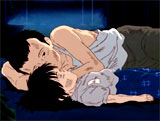
Seita's Vigil Over Setsuko's Death From Starvation
|
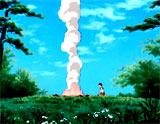
Funeral Pyre for Setsuko
|
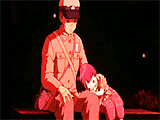
Red-Hued Ghosts of Seita and Setsuko
|
- and the unforgettable,
poignant shot of the red-hued deceased spirits and ghosts of Seita
and Setsuko sitting on a hill overlooking the modern, night-time
skyline of a thriving Tokyo as fireflies danced around the pair
|
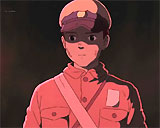
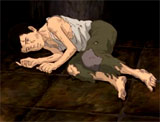
Death of Orphaned Seita
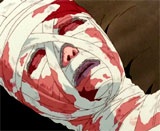
Death of Seita's Mother
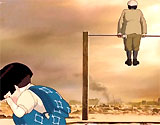
Seita's Attempt to Distract His Young Sister
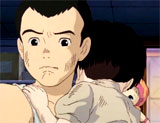
Seita's Anger at Doctor For Not Helping His Dying Sister:
"Where am I supposed to get food?"
|
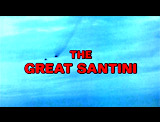
|
The Great Santini (1979)
 #25 #25
- the outdoor driveway basketball scene in which
hyper-competitive Marine Lieutenant Colonel Wilbur "Bull" Meechum
(Robert Duvall) became enraged when he lost a one-on-one basketball
game to his eldest teenaged son Ben (Michael O'Keefe); he
also snapped at his wife Lillian (Blythe Danner), who was congratulating
Ben, before she tearfully stormed off, insisting: "Don't
you talk to me like that!"; a sore loser, Bull wanted to
play more and change the rules, and he also egged
Ben on by repeatedly bouncing a basketball off his head as he walked
into the house and up the stairs, taunting him: "Come on,
Momma's boy, let's see you cry...Come on, little girl, cry!"
- and later that evening during a thunderstorm, Ben's
sarcastic, angry, tearful speech to his forgiving mother when she
insisted Bull really loved him: ("He's got a fabulous way
of showin' it, Mom...Oh, sure. 'I love you, Ben' - PUNCH!
- 'I want you to be the best, Ben' - KICK! - 'And Ben, I think
you're great, Ben' - BOUNCE A BASKETBALL OFF OF MY HEAD!";
she admitted: "You've got a strange father, Ben"
- the scene in the school gym
in which Ben's drunken father urged his son, after being fouled,
to deliberately seek revenge against a taunting
opponent: ("Get
that punk and put him on the deck. You get him or I'm gonna get
you. Get him or you don't come home, all right?"); during further
play, "Bull" shouted to his son from the court's sidelines: "Put
him down, put him down!"
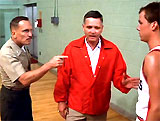
|
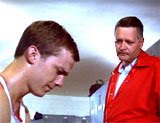
|
|
The Results of Bull's Ill-Advised Urgings to His
Son
|
- after deliberately pushing and breaking an opponent
player's arm and being ejected from the game, an apologetic Ben
was condemned by Coach Spinks (Joe Dorsey) in the locker room:
("You
messed up bad, boy....This team had a chance tonight against a
school that's been crappin' on us for ten years. Then along comes
this idiot who
hadn't got the guts to tell his father to take a flying jump
when that father is just about as wrong as he can be. Now what do
you think I ought to do about it?...")
- the scene in which the entire family gang-tackled
Bull when he became physically abusive with Lillian
- and the scene
after Bull Meechum died in a military plane crash in which Ben, rife
with guilt, admitted that he wished his
father would crash
|


Basketball Game Scene
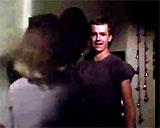
"You've got a strange father, Ben"

After Bull's Plane Crash Death
|

|
The Green Mile (1999)
 #2
#2
- the flashbacked scenes in which illiterate,
mystical child/giant and faith healer - black condemned convict John
Coffey (Michael Clarke Duncan) - resurrected or revived Mr. Jingles,
a small brown mouse that had been stomped upon by sadistic guard
Percy Wetmore (Doug Hutchinson), by blowing life into it in his cupped
hands - causing a bright glow to emanate; he also healed Louisiana
death row prison guard Paul Edgecomb's (Tom Hanks) urinary infection
and the brain tumor of Warden Hal Moores' (James Cromwell) wife Melinda
(Patricia Clarkson)
- the scene of the botched execution of Delacroix (Michael
Jeter) when
his flesh was literally fried when it caught on fire as he slowly
and painfully died. Mean-spirited, vengeful guard Percy had deliberately
sabotaged the execution by not wetting the sponge used to quickly
and efficiently conduct the electricity into Delacroix' body
- the execution of the doomed
and noble Coffey by the electric chair (for an alleged crime he didn't
commit). As he was being prepared, he sang "Heaven, I'm in heaven...
heaven... heaven..." (from the movie Top
Hat). Head death row prison guard
Edgecomb agreed that a required black hood didn't have to be used
to cover Coffey's head, because he feared the dark. Edgecomb pronounced: "May
God have mercy on your soul," and then hesitated for a long
time before giving the fatal order. He first shook Coffey's hand
as he remembered his words, spoken in voice-over: "He kill them
wi' their love. That's how it is every day, all over the world."
Then came the moment that Coffey shared his gifted power with Paul
- every day, Edgecomb was still feeding a piece of toast
to gray-haired Mr. Jingles, while living in a retirement home
- the bittersweet ending in which the elderly Edgecomb
(Dabbs Greer) (after being bestowed with the
'gift of life') - delivered a speech about outliving all of his friends
and families, regarded as his punishment: ("I'm
108 years old, Elaine. I was 44 the year that John Coffey walked
the Green Mile. You mustn't blame John. He couldn't help what happened.
He was just a force of nature. Oh, I've lived to see some amazing
things, Ellie. Another century come to pass. But I've, I've had to
see my friends and loved ones die off through the years. Hal and
Melinda, Brutus Howell, my wife, my boy. And you, Elaine. You'll
die, too. And my curse is knowing that I'll be there to see it. It's
my atonement, you see. It's my punishment for letting John Coffey
ride the lightnin'. For killin' a miracle of God...You'll be gone
like all the others. I'll have to stay. Oh, I'll die eventually.
Of that I'm sure. I have no illusions of immortality. But I will
have wished for death long before death finds me. In truth, I wish
for it already...I lie in bed most nights thinkin' about it. And
I wait. I think about all the people I've loved, now long gone. I
think about my beautiful Jan, how I lost her so many years ago. And
I think about all of us walkin' our own Green Mile, each in our own
time. But one thought more than any other keeps me awake most nights.
If he could make a mouse live so long, how much longer do I
have? We each owe a death. There are no exceptions. But, oh, God,
sometimes, the Green Mile seems so long")
|
End of Film
|

Mr. Jingles
|
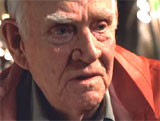
Paul at 108 Years Old
|
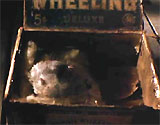
Mr. Jingles In His Box
|
|
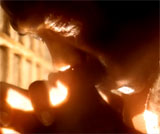
Miracle Worker John Coffey Reviving Mr. Jingles
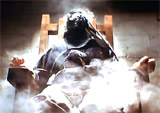
Botched Execution of Delacroix


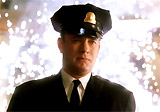
Coffey's Execution
|

|
Groundhog Day (1993)
- time-stuck weather forecaster
Phil Connors' (Bill Murray) heartfelt, romantic speech to sleeping
romantic interest Rita (Andie McDowell) after reading James Joyce's
poem "Trees"
to her: ("What I wanted to say was, I think you're the kindest,
sweetest, prettiest person I've ever met in my life. I've never seen
anyone that's nicer to people than you are. The first time I saw you,
something happened to me. I never told you, but I knew that I wanted
to hold you as hard as I could. I don't deserve someone like you. But
if I ever could, I swear I would love you for the rest of my life");
when Rita woke up briefly to ask: "Did you say something?",
Phil modestly whispered a response:
"Good night, Rita"
- the moment when Phil lept
back into bed with Rita the next morning - after verifying that it
really was a new day - February 3rd - and cried out about his release
from his temporal stasis: ("Do
you know what today is?...Today is tomorrow! It happened!")
|
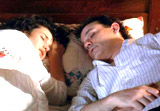
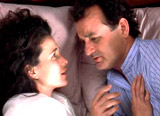
Waking Up On A New Day
|
